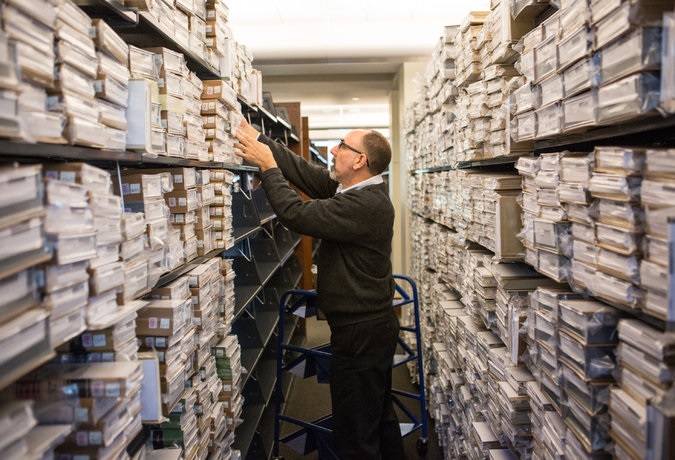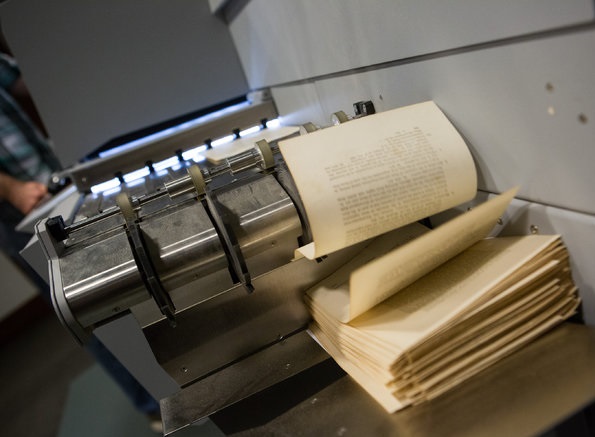Harvard Law Library Readies Trove of Decisions for Digital Age By ERIK ECKHOLMOCT. 28, 2015

Shelves of law books are an august symbol of legal practice, and no place, save the Library of Congress, can match the collection at Harvard’s Law School Library. Its trove includes nearly every state, federal, territorial and tribal judicial decision since colonial times — a priceless potential resource for everyone from legal scholars to defense lawyers trying to challenge a criminal conviction.
Now, in a digital-age sacrifice intended to serve grand intentions, the Harvard librarians are slicing off the spines of all but the rarest volumes and feeding some 40 million pages through a high-speed scanner. They are taking this once unthinkable step to create a complete, searchable database of American case law that will be offered free on the Internet, allowing instant retrieval of vital records that usually must be paid for.
“Improving access to justice is a priority,” said Martha Minow, dean of Harvard Law School, explaining why Harvard has embarked on the project. “We feel an obligation and an opportunity here to open up our resources to the public.”
Stephen Chapman, a digital strategy manager at the Harvard Law library, stacked vacuum-sealed books on shelves after they had been scanned.
CreditCharlie Mahoney for The New York Times

Harvard librarians are slicing off the spines of all but the rarest volumes of law books and feeding some 40 million pages through a high-speed scanner.
CreditCharlie Mahoney for The New York Times
For many years now, bookcases of legal tomes in law offices have been mostly for show. Rather than spending days poring over book indexes and footnoted citations, as law clerks and associates did in earlier times, researchers find what they need on the Internet in minutes. But that nearly always comes at a price.
Though the primary documents are formally in the public domain, many are not put online in a convenient format, if at all. Many states even rely on commercial services to post court briefs and decisions, which then provide them to paying subscribers.
Legal groups spend anywhere from thousands of dollars a year, for a small office, to millions, for a giant firm, using commercial services like Westlaw and LexisNexis to find cases and trace doctrinal strands.
While Harvard’s “Free the Law” project cannot put the lone defense lawyer or citizen on an equal footing with a deep-pocketed law firm, legal experts say, it can at least guarantee a floor of essential information. The project will also offer some sophisticated techniques for visualizing relations among cases and searching for themes. Complete state results will become publicly available this fall for California and New York, and the entire library will be online in 2017, said Daniel Lewis, chief executive and co-founder of Ravel Law, a commercial start-up in California that has teamed up with Harvard Law for the project. The cases will be available at www.ravellaw.com. Ravel is paying millions of dollars to support the scanning. The cases will be accessible in a searchable format and, along with the texts, they will be presented with visual maps developed by the company, which graphically show the evolution through cases of a judicial concept and how each key decision is cited in others.
On Ravel sites currently available to the public, for example, a lawyer planning to challenge the 2010 Citizens United decision, which permitted corporations to make independent political expenditures, canenter “campaign finance” and see in schematic form the major cases at the district, appellate and Supreme Court levels that led up to the 2010 decision and the subsequent cases that cite it.Enter “separate but equal” and the strands from the 1896 decision justifying school segregation to the landmark 1954 decision declaring it unconstitutional are displayed, along with the dozens of related federal and state decisions ever since.
credit: http://www.nytimes.com/2015/10/29/us/harvard-law-library-sacrifices-a-trove-for-the-sake-of-a-free-database.html?ref=education&_r=1